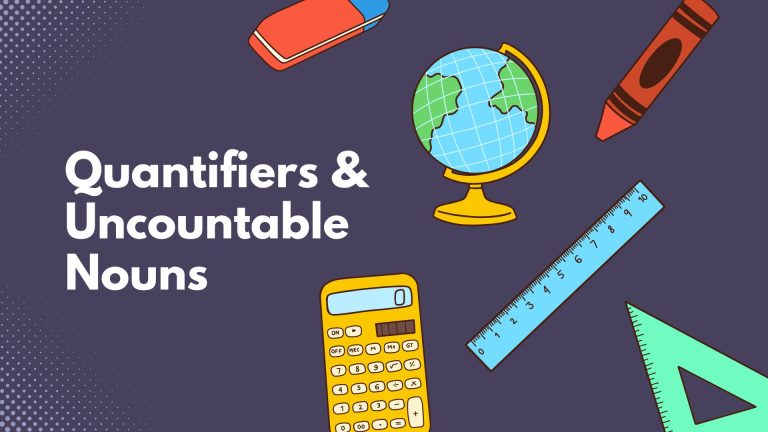Quantifiers with Uncountable Nouns

Common Quantifiers
So, when dealing with things you can’t count one by one, we use quantifiers to help us describe them better.
- Isn’t any: Means there’s none at all. Like when you check the fridge and find no milk. “I don’t have any bread”.
- Very little: A tiny amount. Think of a drop of water in a glass. “There’s very little sugar left in the jar.”
- A little: Some, but not much. Like a small scoop of ice cream. “There’s only a little over cream leftover”.
- Isn’t much: Not a lot there. When you have $5 in your pocket, it isn’t much for shopping. An example is “There isn’t much rice left”.
- Some: An unspecified amount. When you grab some cookies, you don’t count them. Like, “I have some cookies” and “There is some water”.
- A lot of/Lots of: A large amount. Imagine a beach full of sand. “I have a lot of stickers”.
- Too much: More than needed. Like pouring too much salt on your food. “That’s too much orange juice.”
These quantifiers help us describe how much of something we need. For example, knowing the difference between “a little” and “too much” can save a meal from disaster.
Affirmative, Negative, and Interrogative
How do quantifiers with uncountable nouns relate to affirmative, interrogative, and negative sentences? Here’s a table that breaks down their types of quantifiers and their usage.
| Some | A lot of | Much | Many | Any |
|---|---|---|---|---|
| Affirmative sentences | Affirmative sentences | Negative and interrogative sentences | Negative and interrogative sentences | Negative and interrogative sentences |
| Countable and uncountable | Countable and uncountable | Uncountable | Uncountable | Countable and uncountable |
| There is some water on the field. | I have a lot of rocks in my collection. | There isn’t much sugar in coffee. | Are there many children at the party? | Do you have any questions about the homework? |
The proper use of quantifiers in English hinges on the type of sentence (positive, negative, or interrogative). It also takes into account the countability of the noun (countable or uncountable).
Containers and Quantities
As you already know, uncountable nouns are things we can’t count individually, like water or air. For these, we use “much,” “a little,” or “a lot of” to talk about quantity.
Countable nouns are things we can count, like apples and books. We can say “one apple” or “three books.” Quantities for countables often use numbers, “many,” or “a few.”
Here are some examples of using containers for quantities.
So, when you’re planning a party, you might need “three bottles” (countable) of soda and “a lot of” (uncountable) ice.
We can convert pretty much everything from uncountable to countables. Even though we can’t count “music,” we can count the songs or tracks.
Quantifiers with Uncountable Nouns
To wrap it up, we use quantifiers with things you can’t count, like sugar or advice. Whether you say “a little” or “too much,” picking the right word makes your meaning clear.
Do you have any questions or is there something you’re curious about? Feel free to drop your questions in the comment section below, and let’s start a conversation.
